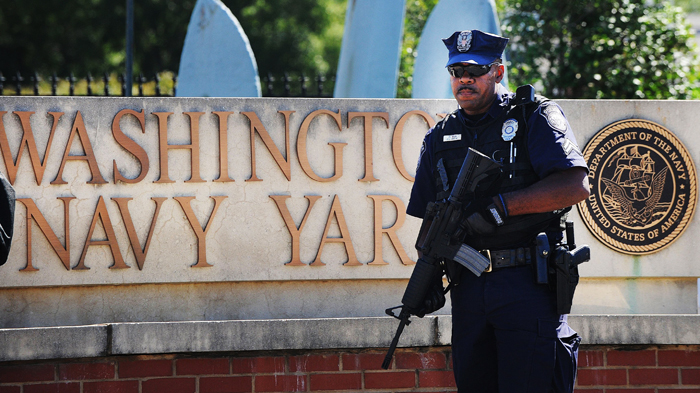Mental health to blame in Navy Yard shooting
Police were eventually able to take down the Navy Yard shooter Aaron Alexis who had a history of mental illness.
September 20, 2013
By now, the tragic news of the shooting at the Washington Navy Yard in Washington, D.C., on Monday has likely reached your ears.
The most publicized tragedies seem to involve guns: the infamous Columbine incident, the shooting of elementary students at Sandy Hook, the victimization of movie goers in Aurora, Colo., and the massacre at a political event in Tucson, Ariz. More importantly the shooters in all these tragedies shared a commonality: mental illness.
The mentally ill should not able to buy guns. Aaron Alexis, the gunmen at the Navy Yard in D.C., suffered from mental problems, according U.S. law enforcement officials as reported by the Huffington Post. Jared Loughner, the shooter of Rep. Gabby Giffords, was also mentally ill, according to reports in a different article by the Huffington Post. Adam Lanza, the shooter at the Sandy Hook elementary, had well-known mental health problems, according reports in the Atlantic Wire.
The banning of guns, or the reduction of their sale, will not necessarily cut down on the carnage associated with the weapon. A study conducted by Harvard University suggests that gun violence occurs as a product of socio-cultural factors rather than rampant availability of firearms.
The study clarifies that gun-restrictive countries such as Russia, rank significantly higher in terms of overall violence in comparison to the U.S. Between 1998 and 2004, Russian murder rates were nearly four times those of the U.S.
This suggests that in countries that have high gun sales but low murder rates, gun owners are more concerned with self-defense or recreational hunting rather than committing violent crimes.
Normal individuals, uninhibited by mental illness or volcanic and uncontrollable tempers, are not murderers. By restricting their rights under the Second Amendment for the sake of a few deranged people, we create a rule that is highly unfair.
In prohibiting the ownership of guns, we penalize the individuals who have followed the rules all along.
Many factors contribute to the high crime rate in the U.S. Although guns may play a role, they certainly aren’t the real killers here.
As the cliché goes: guns don’t kill people, people kill people. A firearm may facilitate a crime, but in itself it is not the reason for the crime. The person who pulls the trigger is the guilty one, not the inanimate object on its own.
A possible solution to the problem is to take better control of who can purchase a firearm. By mandating safety classes or by requiring gun registration for all firearm owners, we can filter the sale of guns to law-abiding individuals. Gun owners who do not comply with the rules should be subjected to a strict penalty.
Although this may be an inconvenience to the already responsible gun owner, it is a precautionary step that allows the overall public to feel a little bit safer within the community.
But most importantly, increased mental health funding is essential if we hope to prevent future massacres. After all, giving up a little goes a long way, especially when it comes to the safety of the American people.
-Michelle Chan is a sophomore animal science major from Phoenix, Ariz. She can be contacted at 335-2290 or by [email protected]. The opinions expressed in this column are not necessarily those of the staff of The Daily Evergreen or those of Student Publications.









